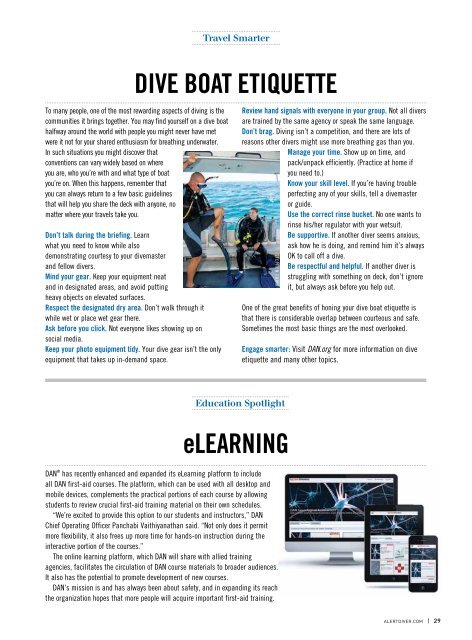AD 2016 Q2
As we pointed out in the spring 2013 edition of the Alert Diver, even being a dive buddy has potential legal implications. So, to bump this up a notch, what about the diver training organisations themselves? Where do they stand? How do they relate to South African law? Are they all considered the same under our legal system in spite of the differences in organisational structures and training programmes? How does this affect their respective instructors and trainee divers from a legal perspective? These are not exactly simple questions. It is certainly true that the respective training organisations differ in a number of ways. However, this does not imply that there are necessarily differential legal implications for each of them. In fact, under South African law, the legal principles are common in all matters. Therefore, if you suffer a loss and you (or your estate in the case of a fatality) wish to recover damages, the legal principles would be applied commonly; whether you are driving or diving. Although not a frequent occurrence, there have been quite a number of law suits associated with diving injuries and damages in South Africa. This is not surprising, as the occurrence of law suits is really a function of “numbers”. As training increases, so do the chances of injuries and, with it, the chances of legal recourse. So, it remains wise to insure yourself, your equipment or your business in a proper and effective way. But before getting back to the potential differences amongst the training agencies, let’s first explore the foundational legal principles on which any civil claim would be adjudicated: inherent risk, negligence and duty to take care.
As we pointed out in the spring 2013 edition of the Alert Diver, even being a dive buddy has potential legal implications. So, to bump this up a notch, what about the diver training organisations themselves? Where do they stand? How do they relate to South African law? Are they all considered the same under our legal system in spite of the differences in organisational structures and training programmes? How does this affect their respective instructors and trainee divers from a legal perspective? These are not exactly simple questions.
It is certainly true that the respective training organisations differ in a number of ways. However, this does not imply that there are necessarily differential legal implications for each of them. In fact, under South African law, the legal principles are common in all matters. Therefore, if you suffer a loss and you (or your estate in the case of a fatality) wish to recover damages, the legal principles would be applied commonly; whether you are driving or diving.
Although not a frequent occurrence, there have been quite a number of law suits associated with diving injuries and damages in South Africa. This is not surprising, as the occurrence of law suits is really a function of “numbers”. As training increases, so do the chances of injuries and, with it, the chances of legal recourse.
So, it remains wise to insure yourself, your equipment or your business in a proper and effective way. But before getting back to the potential differences amongst the training agencies, let’s first explore the foundational legal principles on which any civil claim would be adjudicated: inherent risk, negligence and duty to take care.
Create successful ePaper yourself
Turn your PDF publications into a flip-book with our unique Google optimized e-Paper software.
Travel Smarter<br />
DIVE BOAT ETIQUETTE<br />
To many people, one of the most rewarding aspects of diving is the<br />
communities it brings together. You may find yourself on a dive boat<br />
halfway around the world with people you might never have met<br />
were it not for your shared enthusiasm for breathing underwater.<br />
In such situations you might discover that<br />
conventions can vary widely based on where<br />
you are, who you’re with and what type of boat<br />
you’re on. When this happens, remember that<br />
you can always return to a few basic guidelines<br />
that will help you share the deck with anyone, no<br />
matter where your travels take you.<br />
Don’t talk during the briefing. Learn<br />
what you need to know while also<br />
demonstrating courtesy to your divemaster<br />
and fellow divers.<br />
Mind your gear. Keep your equipment neat<br />
and in designated areas, and avoid putting<br />
heavy objects on elevated surfaces.<br />
Respect the designated dry area. Don’t walk through it<br />
while wet or place wet gear there.<br />
Ask before you click. Not everyone likes showing up on<br />
social media.<br />
Keep your photo equipment tidy. Your dive gear isn’t the only<br />
equipment that takes up in-demand space.<br />
Review hand signals with everyone in your group. Not all divers<br />
are trained by the same agency or speak the same language.<br />
Don’t brag. Diving isn’t a competition, and there are lots of<br />
reasons other divers might use more breathing gas than you.<br />
Manage your time. Show up on time, and<br />
pack/unpack efficiently. (Practice at home if<br />
you need to.)<br />
Know your skill level. If you’re having trouble<br />
perfecting any of your skills, tell a divemaster<br />
or guide.<br />
Use the correct rinse bucket. No one wants to<br />
rinse his/her regulator with your wetsuit.<br />
Be supportive. If another diver seems anxious,<br />
ask how he is doing, and remind him it’s always<br />
OK to call off a dive.<br />
Be respectful and helpful. If another diver is<br />
struggling with something on deck, don’t ignore<br />
it, but always ask before you help out.<br />
STEPHEN FRINK<br />
One of the great benefits of honing your dive boat etiquette is<br />
that there is considerable overlap between courteous and safe.<br />
Sometimes the most basic things are the most overlooked.<br />
Engage smarter: Visit DAN.org for more information on dive<br />
etiquette and many other topics.<br />
Education Spotlight<br />
eLEARNING<br />
DAN ® has recently enhanced and expanded its eLearning platform to include<br />
all DAN first-aid courses. The platform, which can be used with all desktop and<br />
mobile devices, complements the practical portions of each course by allowing<br />
students to review crucial first-aid training material on their own schedules.<br />
“We’re excited to provide this option to our students and instructors,” DAN<br />
Chief Operating Officer Panchabi Vaithiyanathan said. “Not only does it permit<br />
more flexibility, it also frees up more time for hands-on instruction during the<br />
interactive portion of the courses.”<br />
The online learning platform, which DAN will share with allied training<br />
agencies, facilitates the circulation of DAN course materials to broader audiences.<br />
It also has the potential to promote development of new courses.<br />
DAN’s mission is and has always been about safety, and in expanding its reach,<br />
the organization hopes that more people will acquire important first-aid training.<br />
PHOTO CREDIT<br />
ALERTDIVER.COM | 29









